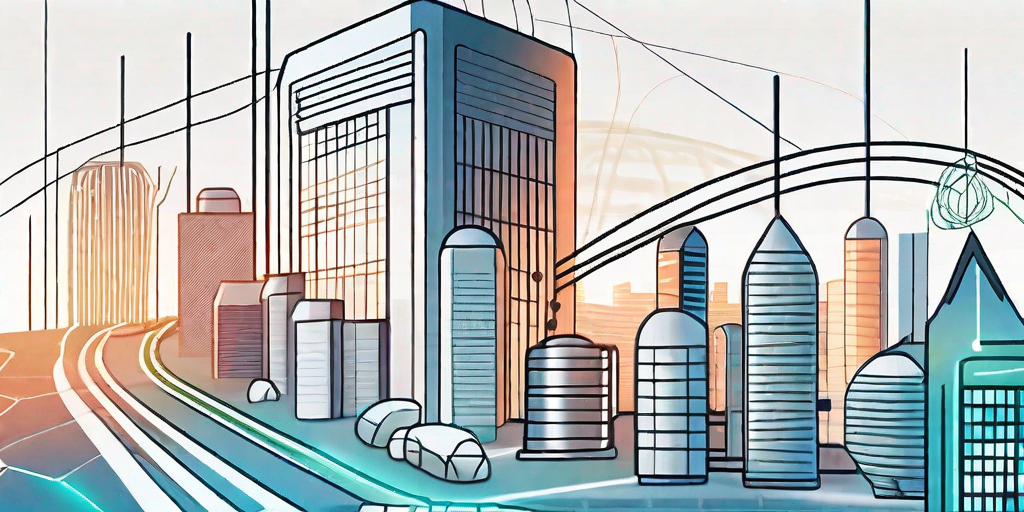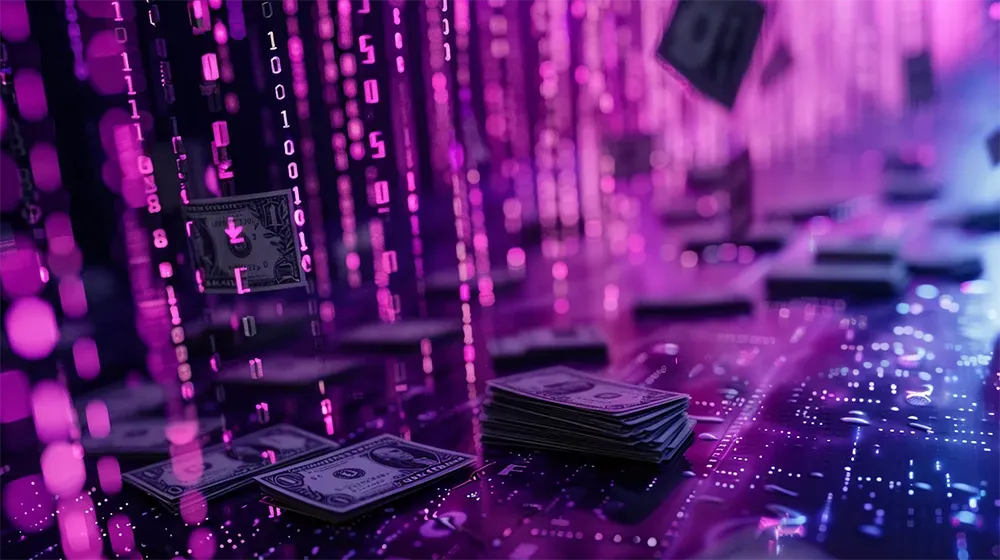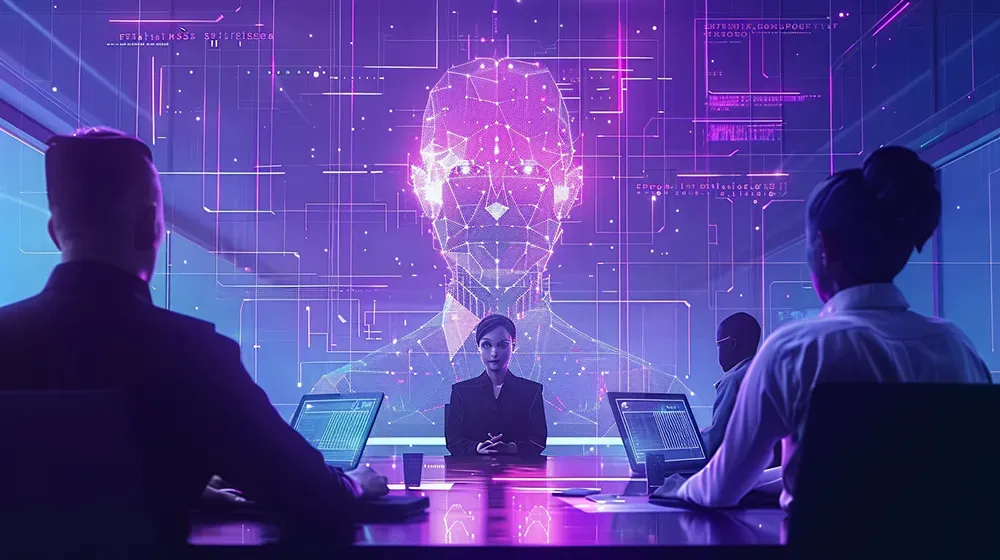Understanding Internet of Things with an Innovation Futurist's Help

Understanding Internet of Things with an Innovation Futurist's Help
The Internet of Things (IoT) represents a paradigm shift in the way we think about technology and its impact on our lives. With a multitude of connected devices and sensors, the possibilities are endless. But understanding this complex ecosystem can be daunting. Luckily, we have the help of innovation futurists, who specialize in deciphering the intricacies of IoT and guiding us towards its full potential.
Understanding the Basics of Internet of Things
Before diving into the role of an innovation futurist, it's crucial to grasp the fundamentals of IoT. At its core, IoT refers to the network of physical devices, vehicles, appliances, and other objects embedded with sensors, software, and connectivity that enables them to collect and exchange data. This interconnectedness allows for seamless communication and automation, leading to increased efficiency and improved decision-making.
But IoT is not just limited to consumer applications; it has permeated various industries, including healthcare, manufacturing, and transportation. For instance, in healthcare, IoT devices can monitor vital signs, track medication adherence, and provide immediate feedback to both patients and healthcare professionals. This revolutionizes the way healthcare is delivered, as it enables remote patient monitoring and personalized treatment plans.
In manufacturing, IoT enables real-time monitoring of machines, improving maintenance and reducing downtime. By equipping machines with sensors, manufacturers can gather data on performance, temperature, and other critical parameters. This data can then be analyzed to identify patterns and anomalies, allowing for predictive maintenance and proactive troubleshooting. The integration of IoT in manufacturing processes also facilitates the concept of "smart factories," where machines and systems communicate with each other to optimize production and minimize waste.
Similarly, in the transportation industry, IoT sensors in vehicles help optimize fuel consumption and enhance safety. By collecting data on driving behavior, road conditions, and traffic patterns, IoT-enabled vehicles can provide real-time feedback to drivers, alerting them to potential hazards and suggesting alternative routes. This not only improves fuel efficiency but also reduces accidents and congestion on the roads.
Moreover, IoT has the potential to revolutionize the way we interact with our environment. Smart cities, for example, leverage IoT technology to monitor and manage various aspects of urban life, such as traffic flow, energy consumption, and waste management. By collecting and analyzing data from sensors placed throughout the city, authorities can make informed decisions to improve the quality of life for residents, optimize resource allocation, and reduce environmental impact.
As IoT continues to evolve, its impact on our daily lives and industries will only grow. From healthcare to manufacturing to transportation and beyond, the possibilities are endless. By harnessing the power of IoT, we can create a more connected and efficient world, where data-driven insights drive innovation and improve the way we live, work, and interact with our surroundings.
Role of an Innovation Futurist in Unveiling IoT Complexities
The rapid growth of IoT has given rise to countless opportunities, but along with them come numerous complexities. This is where innovation futurists come in. These experts have a deep understanding of emerging technologies and possess the vision and foresight to navigate the intricacies of IoT.
An innovation futurist acts as a guide, helping businesses and individuals unlock the true potential of IoT. They analyze trends, assess risks, and provide strategic recommendations tailored to a specific industry or organization. By staying ahead of the curve, they enable companies to make informed decisions about IoT adoption, integration, and implementation.
Furthermore, innovation futurists assist in demystifying the jargon associated with IoT. They break down technical concepts into digestible explanations, ensuring that individuals of all backgrounds can grasp the transformative power of IoT. Through engaging presentations and workshops, they empower both professionals and laypeople to explore the possibilities and navigate the challenges presented by this ever-evolving landscape.
One of the key responsibilities of an innovation futurist is to stay updated with the latest advancements in IoT. They constantly monitor industry trends, research new technologies, and attend conferences and seminars to expand their knowledge. This allows them to provide accurate and up-to-date insights to their clients, helping them make informed decisions.
Moreover, innovation futurists play a crucial role in identifying potential risks and challenges associated with IoT implementation. They conduct thorough risk assessments, considering factors such as data security, privacy concerns, and regulatory compliance. By addressing these issues proactively, they help organizations mitigate risks and ensure a smooth transition into the IoT landscape.
In addition to their technical expertise, innovation futurists possess strong strategic thinking and problem-solving skills. They are able to envision the future possibilities of IoT and develop innovative strategies to leverage its potential. By understanding the unique needs and goals of each client, they can tailor their recommendations and solutions accordingly, maximizing the benefits of IoT adoption.
Furthermore, innovation futurists act as catalysts for collaboration and knowledge sharing. They bring together stakeholders from different industries and facilitate discussions and brainstorming sessions. By fostering an environment of collaboration, they encourage the exchange of ideas and promote cross-industry innovation, leading to the development of groundbreaking IoT solutions.
Lastly, innovation futurists are passionate advocates for the ethical and responsible use of IoT. They emphasize the importance of data privacy and security, ensuring that organizations implement robust measures to protect sensitive information. They also advocate for transparency and accountability in IoT systems, promoting the development of ethical frameworks and guidelines.
In conclusion, innovation futurists play a vital role in unveiling the complexities of IoT. Through their deep understanding of emerging technologies, strategic thinking, and collaborative approach, they guide businesses and individuals towards harnessing the full potential of IoT. With their expertise, organizations can navigate the challenges and risks associated with IoT implementation, making informed decisions and driving innovation in this rapidly evolving landscape.
The Intersection of IoT and Digital Transformation
IoT is not just a standalone technology; it is intricately linked with the broader phenomenon of digital transformation. As businesses embrace digitalization, IoT becomes a critical enabler of innovation and growth.
One of the key advantages of IoT is its ability to collect vast amounts of data. This data can range from customer preferences to machine performance, providing organizations with valuable insights. For example, a retail store equipped with IoT sensors can analyze foot traffic patterns to optimize store layout and product placement. By understanding how customers move through the store, businesses can strategically position products to increase sales and improve the overall shopping experience.
But the benefits of IoT go beyond just data collection. IoT also facilitates the automation of routine tasks, freeing up employees to focus on higher-value activities. For instance, in a manufacturing facility, IoT-enabled machines can automatically monitor and adjust their performance, reducing the need for manual intervention. This not only improves efficiency but also minimizes the risk of human error.
Moreover, IoT extends beyond internal operations and offers new avenues for customer engagement. By leveraging IoT devices, businesses can offer personalized recommendations, proactive maintenance, and timely support. Imagine a smart home security system that not only detects intrusions but also sends real-time alerts to homeowners and emergency services. This level of proactive monitoring not only enhances the customer experience but also ensures the safety and security of individuals and their property.
Furthermore, the integration of IoT with digital transformation opens up opportunities for new business models. For example, subscription-based services can be enhanced by IoT devices that track usage and automatically replenish supplies. This not only simplifies the customer experience but also creates a recurring revenue stream for businesses.
In conclusion, IoT plays a crucial role in the digital transformation journey of businesses. It enables data-driven decision-making, automates routine tasks, enhances customer engagement, and creates new business models. As organizations continue to embrace digitalization, the intersection of IoT and digital transformation will become even more significant, driving innovation and growth across industries.
How an Innovation Futurist Forecasts IoT Trends
Forecasting future trends in a rapidly evolving landscape like IoT requires a unique set of skills. Innovation futurists employ a combination of market analysis, qualitative research, and expert insights to identify emerging trends and potential disruptors.
They continuously scan the horizon for technological advancements, regulatory developments, and evolving consumer behaviors. By identifying patterns and connections, they uncover hidden opportunities and predict the direction in which IoT is heading.
Furthermore, innovation futurists tap into their network of industry experts, thought leaders, and innovators to gather diverse perspectives and validate their forecasts. By engaging with a wide range of stakeholders, they ensure that their insights are grounded in reality and not confined to mere speculation.
One of the key aspects of forecasting IoT trends is staying updated with the latest technological advancements. Innovation futurists immerse themselves in the world of IoT, constantly exploring new devices, platforms, and applications. They attend industry conferences, participate in hackathons, and collaborate with IoT startups to gain firsthand experience and insights into the cutting-edge technologies shaping the future.
Additionally, innovation futurists closely monitor regulatory developments that may impact the IoT landscape. They keep a keen eye on government policies, industry standards, and privacy regulations to understand how they may influence the adoption and growth of IoT. By staying informed about the legal and ethical implications of IoT, futurists can better anticipate potential challenges and opportunities that may arise in the future.
Understanding consumer behaviors and preferences is another crucial aspect of forecasting IoT trends. Innovation futurists conduct qualitative research, such as surveys and focus groups, to gain insights into how consumers interact with IoT devices and services. By analyzing user feedback and observing usage patterns, they can identify emerging trends and anticipate the needs and desires of future IoT users.
Moreover, innovation futurists leverage their network of industry experts, thought leaders, and innovators to validate their forecasts. They engage in discussions, interviews, and collaborative projects to gather diverse perspectives and challenge their own assumptions. By embracing a collaborative approach, futurists ensure that their predictions are well-rounded and supported by a wide range of expertise.
In conclusion, forecasting IoT trends requires a multifaceted approach that combines market analysis, qualitative research, and expert insights. Innovation futurists play a crucial role in shaping the future of IoT by identifying emerging trends, uncovering hidden opportunities, and validating their forecasts through collaboration and engagement with industry stakeholders. As the IoT landscape continues to evolve, the expertise of innovation futurists will be indispensable in navigating the complexities and harnessing the full potential of this transformative technology.
Adopting IoT Innovations for Business Growth
The benefits of IoT are undeniable, but organizations must approach its adoption strategically to maximize its potential. This is where innovation futurists play a crucial role in guiding businesses towards successful IoT implementation.
An innovation futurist helps companies evaluate their existing infrastructure and identify areas where IoT can drive the most significant impact. They develop tailored strategies that align IoT initiatives with business goals, ensuring that the investment in IoT technology translates into tangible outcomes.
Moreover, innovation futurists understand that IoT implementation is not a one-size-fits-all approach. They address cybersecurity concerns, data privacy issues, and interoperability challenges to mitigate risks and ensure the smooth integration of IoT solutions. By collaborating with IT departments and other relevant stakeholders, they facilitate the adoption of best practices and standards that safeguard the integrity and security of IoT ecosystems.
Conclusion
In conclusion, understanding the complexities of IoT requires the expertise of an innovation futurist. They unravel the intricacies of this ever-evolving landscape, enabling businesses and individuals to navigate the vast possibilities and challenges presented by IoT. As IoT continues to shape our future, the guidance of innovation futurists becomes increasingly indispensable. By embracing their insights and recommendations, organizations can harness the transformative power of IoT and pave the way for a more connected and automated world.
FAQ
What is the Internet of Things (IoT)?
The Internet of Things (IoT) refers to the network of physical devices, vehicles, appliances, and other objects embedded with sensors, software, and connectivity that enables them to collect and exchange data. It allows for seamless communication and automation, leading to increased efficiency and improved decision-making.
What is the role of an innovation futurist in relation to IoT?
An innovation futurist acts as a guide, helping businesses and individuals unlock the true potential of IoT. They analyze trends, assess risks, and provide strategic recommendations tailored to specific industries or organizations. Their expertise enables companies to make informed decisions about IoT adoption, integration, and implementation.
How do innovation futurists forecast IoT trends?
Innovation futurists employ a combination of market analysis, qualitative research, and expert insights to forecast IoT trends. They stay updated with the latest technological advancements, monitor regulatory developments, and understand consumer behaviors and preferences. They also engage with industry experts and thought leaders to validate their forecasts and ensure a well-rounded perspective.
Contact a Innovation Futurist for Your Event
If you're looking for a speaker who can demystify the complexities of IoT and guide your organization towards its full potential, look no further than Dr Mark van Rijmenam. As an experienced innovation futurist, Dr van Rijmenam can provide deep insights into emerging technologies, assess risks, and offer strategic recommendations tailored to your specific industry or organization. His engaging presentations and workshops will empower your team to explore the possibilities and navigate the challenges of IoT. Don't miss the opportunity to harness the transformative power of IoT with Dr van Rijmenam's expertise. Simply complete the form below and we will be in touch within 24 hours to discuss how Dr van Rijmenam can contribute to the success of your event.






